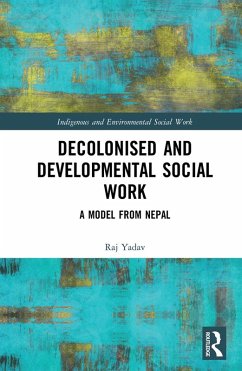40,95 €
40,95 €
inkl. MwSt.
Sofort per Download lieferbar

20 °P sammeln
40,95 €
Als Download kaufen

40,95 €
inkl. MwSt.
Sofort per Download lieferbar

20 °P sammeln
Jetzt verschenken
Alle Infos zum eBook verschenken
40,95 €
inkl. MwSt.
Sofort per Download lieferbar
Alle Infos zum eBook verschenken

20 °P sammeln
- Format: ePub
- Merkliste
- Auf die Merkliste
- Bewerten Bewerten
- Teilen
- Produkt teilen
- Produkterinnerung
- Produkterinnerung

Bitte loggen Sie sich zunächst in Ihr Kundenkonto ein oder registrieren Sie sich bei
bücher.de, um das eBook-Abo tolino select nutzen zu können.
Hier können Sie sich einloggen
Hier können Sie sich einloggen
Sie sind bereits eingeloggt. Klicken Sie auf 2. tolino select Abo, um fortzufahren.

Bitte loggen Sie sich zunächst in Ihr Kundenkonto ein oder registrieren Sie sich bei bücher.de, um das eBook-Abo tolino select nutzen zu können.
Using new empirical data and an extensive detail of social, cultural and political dimensions of Nepal, this book proposes a new model of 'decolonised, developmental social work' that can be applicable in a wide range of countries and cultures.
- Geräte: eReader
- mit Kopierschutz
- eBook Hilfe
- Größe: 3.17MB
Andere Kunden interessierten sich auch für
![Social Development and Social Work Perspectives on Social Protection (eBook, ePUB) Social Development and Social Work Perspectives on Social Protection (eBook, ePUB)]() Social Development and Social Work Perspectives on Social Protection (eBook, ePUB)46,95 €
Social Development and Social Work Perspectives on Social Protection (eBook, ePUB)46,95 €![Health and Care in Old Age in Africa (eBook, ePUB) Health and Care in Old Age in Africa (eBook, ePUB)]() Health and Care in Old Age in Africa (eBook, ePUB)43,95 €
Health and Care in Old Age in Africa (eBook, ePUB)43,95 €![Ubuntu Philosophy and Decolonising Social Work Fields of Practice in Africa (eBook, ePUB) Ubuntu Philosophy and Decolonising Social Work Fields of Practice in Africa (eBook, ePUB)]() Ubuntu Philosophy and Decolonising Social Work Fields of Practice in Africa (eBook, ePUB)40,95 €
Ubuntu Philosophy and Decolonising Social Work Fields of Practice in Africa (eBook, ePUB)40,95 €![The Routledge International Handbook of Social Work and Disaster Practice (eBook, ePUB) The Routledge International Handbook of Social Work and Disaster Practice (eBook, ePUB)]() The Routledge International Handbook of Social Work and Disaster Practice (eBook, ePUB)46,95 €
The Routledge International Handbook of Social Work and Disaster Practice (eBook, ePUB)46,95 €![Social Work During COVID-19 (eBook, ePUB) Social Work During COVID-19 (eBook, ePUB)]() Social Work During COVID-19 (eBook, ePUB)40,95 €
Social Work During COVID-19 (eBook, ePUB)40,95 €![Social Work in Health Emergencies (eBook, ePUB) Social Work in Health Emergencies (eBook, ePUB)]() Social Work in Health Emergencies (eBook, ePUB)40,95 €
Social Work in Health Emergencies (eBook, ePUB)40,95 €![Transformative Innovation for Sustainable Human Settlements (eBook, ePUB) Transformative Innovation for Sustainable Human Settlements (eBook, ePUB)]() Transformative Innovation for Sustainable Human Settlements (eBook, ePUB)42,95 €
Transformative Innovation for Sustainable Human Settlements (eBook, ePUB)42,95 €-
-
-
Using new empirical data and an extensive detail of social, cultural and political dimensions of Nepal, this book proposes a new model of 'decolonised, developmental social work' that can be applicable in a wide range of countries and cultures.
Dieser Download kann aus rechtlichen Gründen nur mit Rechnungsadresse in A, B, BG, CY, CZ, D, DK, EW, E, FIN, F, GR, HR, H, IRL, I, LT, L, LR, M, NL, PL, P, R, S, SLO, SK ausgeliefert werden.
Produktdetails
- Produktdetails
- Verlag: Taylor & Francis eBooks
- Seitenzahl: 202
- Erscheinungstermin: 1. April 2019
- Englisch
- ISBN-13: 9780429820243
- Artikelnr.: 56149569
- Verlag: Taylor & Francis eBooks
- Seitenzahl: 202
- Erscheinungstermin: 1. April 2019
- Englisch
- ISBN-13: 9780429820243
- Artikelnr.: 56149569
- Herstellerkennzeichnung Die Herstellerinformationen sind derzeit nicht verfügbar.
Raj Yadav, PhD, is from Nepal, and now makes his temporary home in Australia. His interest lies in decolonising epistemologies and their use in advancing knowledge production in the fields of social work and development. He has worked as a lecturer and has contributed to social work curriculum development in universities in Nepal and Australia.
List of figures
List of tables
List of abbreviations
Acknowledgements
Notes on transliteration and Nepali terminology
Meaning of Nepali terms and cultural practices
Foreword
Preface
Prologue: an honest, heretofore untold story of Nepali social work
Chapter 1: Thinking about decolonised and developmental social work
Why decolonised, developmental social work?
Decolonised and developmental social work: pedagogy, politics, and praxis
Background to, and rationale for, the decolonised, developmental social work in Nepal
Genesis, central arguments, and inquiry method of the book
Author's positionality and reflexivity in knowledge production
Synergies with indigenous ways of knowing
Synergies with a critical theory and thinking
Definition of key terms used in the book
Way forward
Chapter 2: The puzzle of Nepali narratives: historical dynamics and contemporary issues
Geography, ecology, and regional dynamics
Critical junctures in the making of the Nepali state
Revisiting Nepali history: One step forward, two steps back
Sociocultural groups of Nepal: cleavage, conflict, and new politics
Quest for inclusion, rights, and justice: revisiting the people's movements and Maoist insurgency
Lifestyles, values, and identities: cultural narratives
Context of social services: state and non-state actors
Conclusion
Chapter 3: International non-government organisation and Nepali development: a place for Nepali social workers to engage
Metaphysics of, and definitional challenges to, INGOs
INGOs in Nepal
Development planning and INGOs' engagement in Nepal
INGO culpability for failed development
Costs of development
Conclusion
Chapter 4: Social work education in Nepal: a brief historical perspective
Historical development of higher education in Nepal
Development of social work education in Nepal
Contemporary scenario of social work education in Nepal
Influence of international organisations on social work education
Major issues in social work education
Conclusion
Chapter 5: From an imported model to a decolonisation of social work
Revisiting imported social work in Nepal
Modernising social work
Technology transfer: from the West to the rest
Indigenous social work: concept and construct
A paradigm shift from indigenisation to decolonisation
Conclusion
Chapter 6: Influence and context for decolonised and developmental Nepali social work
Social workers' motivations
Concerns about Nepali social work education
Concerns about professional elitism
What the 'social' in Nepali 'social work' entails: the case for decolonisation
Social issues for Nepali social work: the case for development
Advocating for the voiceless: the case for political focus
Conclusion
Chapter 7: Decolonised and developmental Nepali social work: a model ground up
Social workers' concerns
Social components of decolonised practice
Developmental components of decolonising practice
Political components of decolonising practice
Model of decolonised and developmental Nepali social work practice
Implications in social work: synergies with extant literature
Conclusion
Chapter 8: Moving forward
Yet, a temporal end
The best of decolonisation
References
Index
List of tables
List of abbreviations
Acknowledgements
Notes on transliteration and Nepali terminology
Meaning of Nepali terms and cultural practices
Foreword
Preface
Prologue: an honest, heretofore untold story of Nepali social work
Chapter 1: Thinking about decolonised and developmental social work
Why decolonised, developmental social work?
Decolonised and developmental social work: pedagogy, politics, and praxis
Background to, and rationale for, the decolonised, developmental social work in Nepal
Genesis, central arguments, and inquiry method of the book
Author's positionality and reflexivity in knowledge production
Synergies with indigenous ways of knowing
Synergies with a critical theory and thinking
Definition of key terms used in the book
Way forward
Chapter 2: The puzzle of Nepali narratives: historical dynamics and contemporary issues
Geography, ecology, and regional dynamics
Critical junctures in the making of the Nepali state
Revisiting Nepali history: One step forward, two steps back
Sociocultural groups of Nepal: cleavage, conflict, and new politics
Quest for inclusion, rights, and justice: revisiting the people's movements and Maoist insurgency
Lifestyles, values, and identities: cultural narratives
Context of social services: state and non-state actors
Conclusion
Chapter 3: International non-government organisation and Nepali development: a place for Nepali social workers to engage
Metaphysics of, and definitional challenges to, INGOs
INGOs in Nepal
Development planning and INGOs' engagement in Nepal
INGO culpability for failed development
Costs of development
Conclusion
Chapter 4: Social work education in Nepal: a brief historical perspective
Historical development of higher education in Nepal
Development of social work education in Nepal
Contemporary scenario of social work education in Nepal
Influence of international organisations on social work education
Major issues in social work education
Conclusion
Chapter 5: From an imported model to a decolonisation of social work
Revisiting imported social work in Nepal
Modernising social work
Technology transfer: from the West to the rest
Indigenous social work: concept and construct
A paradigm shift from indigenisation to decolonisation
Conclusion
Chapter 6: Influence and context for decolonised and developmental Nepali social work
Social workers' motivations
Concerns about Nepali social work education
Concerns about professional elitism
What the 'social' in Nepali 'social work' entails: the case for decolonisation
Social issues for Nepali social work: the case for development
Advocating for the voiceless: the case for political focus
Conclusion
Chapter 7: Decolonised and developmental Nepali social work: a model ground up
Social workers' concerns
Social components of decolonised practice
Developmental components of decolonising practice
Political components of decolonising practice
Model of decolonised and developmental Nepali social work practice
Implications in social work: synergies with extant literature
Conclusion
Chapter 8: Moving forward
Yet, a temporal end
The best of decolonisation
References
Index
List of figures
List of tables
List of abbreviations
Acknowledgements
Notes on transliteration and Nepali terminology
Meaning of Nepali terms and cultural practices
Foreword
Preface
Prologue: an honest, heretofore untold story of Nepali social work
Chapter 1: Thinking about decolonised and developmental social work
Why decolonised, developmental social work?
Decolonised and developmental social work: pedagogy, politics, and praxis
Background to, and rationale for, the decolonised, developmental social work in Nepal
Genesis, central arguments, and inquiry method of the book
Author's positionality and reflexivity in knowledge production
Synergies with indigenous ways of knowing
Synergies with a critical theory and thinking
Definition of key terms used in the book
Way forward
Chapter 2: The puzzle of Nepali narratives: historical dynamics and contemporary issues
Geography, ecology, and regional dynamics
Critical junctures in the making of the Nepali state
Revisiting Nepali history: One step forward, two steps back
Sociocultural groups of Nepal: cleavage, conflict, and new politics
Quest for inclusion, rights, and justice: revisiting the people's movements and Maoist insurgency
Lifestyles, values, and identities: cultural narratives
Context of social services: state and non-state actors
Conclusion
Chapter 3: International non-government organisation and Nepali development: a place for Nepali social workers to engage
Metaphysics of, and definitional challenges to, INGOs
INGOs in Nepal
Development planning and INGOs' engagement in Nepal
INGO culpability for failed development
Costs of development
Conclusion
Chapter 4: Social work education in Nepal: a brief historical perspective
Historical development of higher education in Nepal
Development of social work education in Nepal
Contemporary scenario of social work education in Nepal
Influence of international organisations on social work education
Major issues in social work education
Conclusion
Chapter 5: From an imported model to a decolonisation of social work
Revisiting imported social work in Nepal
Modernising social work
Technology transfer: from the West to the rest
Indigenous social work: concept and construct
A paradigm shift from indigenisation to decolonisation
Conclusion
Chapter 6: Influence and context for decolonised and developmental Nepali social work
Social workers' motivations
Concerns about Nepali social work education
Concerns about professional elitism
What the 'social' in Nepali 'social work' entails: the case for decolonisation
Social issues for Nepali social work: the case for development
Advocating for the voiceless: the case for political focus
Conclusion
Chapter 7: Decolonised and developmental Nepali social work: a model ground up
Social workers' concerns
Social components of decolonised practice
Developmental components of decolonising practice
Political components of decolonising practice
Model of decolonised and developmental Nepali social work practice
Implications in social work: synergies with extant literature
Conclusion
Chapter 8: Moving forward
Yet, a temporal end
The best of decolonisation
References
Index
List of tables
List of abbreviations
Acknowledgements
Notes on transliteration and Nepali terminology
Meaning of Nepali terms and cultural practices
Foreword
Preface
Prologue: an honest, heretofore untold story of Nepali social work
Chapter 1: Thinking about decolonised and developmental social work
Why decolonised, developmental social work?
Decolonised and developmental social work: pedagogy, politics, and praxis
Background to, and rationale for, the decolonised, developmental social work in Nepal
Genesis, central arguments, and inquiry method of the book
Author's positionality and reflexivity in knowledge production
Synergies with indigenous ways of knowing
Synergies with a critical theory and thinking
Definition of key terms used in the book
Way forward
Chapter 2: The puzzle of Nepali narratives: historical dynamics and contemporary issues
Geography, ecology, and regional dynamics
Critical junctures in the making of the Nepali state
Revisiting Nepali history: One step forward, two steps back
Sociocultural groups of Nepal: cleavage, conflict, and new politics
Quest for inclusion, rights, and justice: revisiting the people's movements and Maoist insurgency
Lifestyles, values, and identities: cultural narratives
Context of social services: state and non-state actors
Conclusion
Chapter 3: International non-government organisation and Nepali development: a place for Nepali social workers to engage
Metaphysics of, and definitional challenges to, INGOs
INGOs in Nepal
Development planning and INGOs' engagement in Nepal
INGO culpability for failed development
Costs of development
Conclusion
Chapter 4: Social work education in Nepal: a brief historical perspective
Historical development of higher education in Nepal
Development of social work education in Nepal
Contemporary scenario of social work education in Nepal
Influence of international organisations on social work education
Major issues in social work education
Conclusion
Chapter 5: From an imported model to a decolonisation of social work
Revisiting imported social work in Nepal
Modernising social work
Technology transfer: from the West to the rest
Indigenous social work: concept and construct
A paradigm shift from indigenisation to decolonisation
Conclusion
Chapter 6: Influence and context for decolonised and developmental Nepali social work
Social workers' motivations
Concerns about Nepali social work education
Concerns about professional elitism
What the 'social' in Nepali 'social work' entails: the case for decolonisation
Social issues for Nepali social work: the case for development
Advocating for the voiceless: the case for political focus
Conclusion
Chapter 7: Decolonised and developmental Nepali social work: a model ground up
Social workers' concerns
Social components of decolonised practice
Developmental components of decolonising practice
Political components of decolonising practice
Model of decolonised and developmental Nepali social work practice
Implications in social work: synergies with extant literature
Conclusion
Chapter 8: Moving forward
Yet, a temporal end
The best of decolonisation
References
Index







